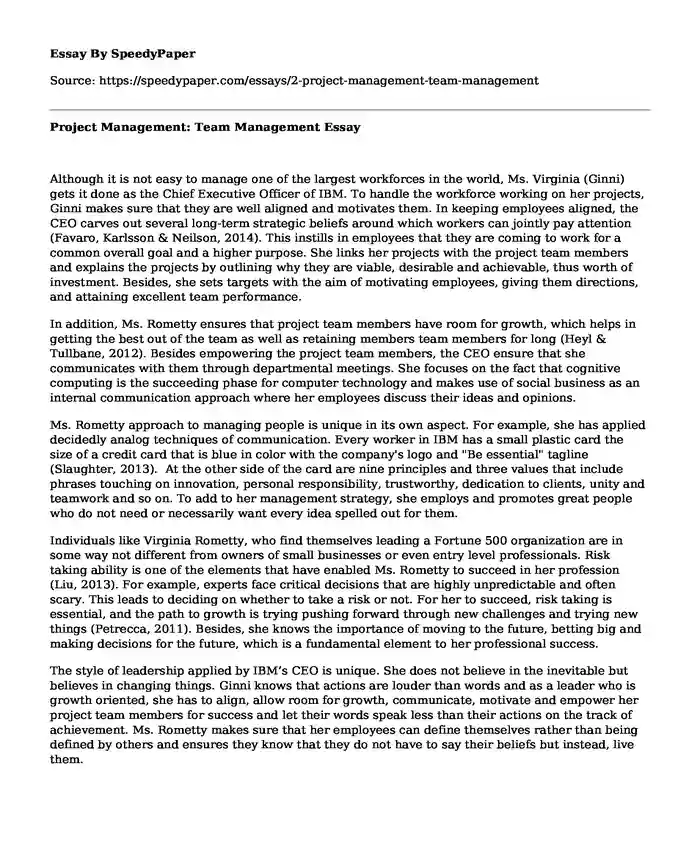
| Type of paper: | Essay |
| Categories: | Project management Leadership analysis Company Management |
| Pages: | 3 |
| Wordcount: | 657 words |
Although it is not easy to manage one of the largest workforces in the world, Ms. Virginia (Ginni) gets it done as the Chief Executive Officer of IBM. To handle the workforce working on her projects, Ginni makes sure that they are well aligned and motivates them. In keeping employees aligned, the CEO carves out several long-term strategic beliefs around which workers can jointly pay attention (Favaro, Karlsson & Neilson, 2014). This instills in employees that they are coming to work for a common overall goal and a higher purpose. She links her projects with the project team members and explains the projects by outlining why they are viable, desirable and achievable, thus worth of investment. Besides, she sets targets with the aim of motivating employees, giving them directions, and attaining excellent team performance.
In addition, Ms. Rometty ensures that project team members have room for growth, which helps in getting the best out of the team as well as retaining members team members for long (Heyl & Tullbane, 2012). Besides empowering the project team members, the CEO ensure that she communicates with them through departmental meetings. She focuses on the fact that cognitive computing is the succeeding phase for computer technology and makes use of social business as an internal communication approach where her employees discuss their ideas and opinions.
Ms. Rometty approach to managing people is unique in its own aspect. For example, she has applied decidedly analog techniques of communication. Every worker in IBM has a small plastic card the size of a credit card that is blue in color with the company's logo and "Be essential" tagline (Slaughter, 2013). At the other side of the card are nine principles and three values that include phrases touching on innovation, personal responsibility, trustworthy, dedication to clients, unity and teamwork and so on. To add to her management strategy, she employs and promotes great people who do not need or necessarily want every idea spelled out for them.
Individuals like Virginia Rometty, who find themselves leading a Fortune 500 organization are in some way not different from owners of small businesses or even entry level professionals. Risk taking ability is one of the elements that have enabled Ms. Rometty to succeed in her profession (Liu, 2013). For example, experts face critical decisions that are highly unpredictable and often scary. This leads to deciding on whether to take a risk or not. For her to succeed, risk taking is essential, and the path to growth is trying pushing forward through new challenges and trying new things (Petrecca, 2011). Besides, she knows the importance of moving to the future, betting big and making decisions for the future, which is a fundamental element to her professional success.
The style of leadership applied by IBM’s CEO is unique. She does not believe in the inevitable but believes in changing things. Ginni knows that actions are louder than words and as a leader who is growth oriented, she has to align, allow room for growth, communicate, motivate and empower her project team members for success and let their words speak less than their actions on the track of achievement. Ms. Rometty makes sure that her employees can define themselves rather than being defined by others and ensures they know that they do not have to say their beliefs but instead, live them.
References
Favaro, K., Karlsson, P. O., & Neilson, G. L. (2014). The Lives and Times of the CEO. PwC Strategy&.
Heyl, J. D., & Tullbane, J. (2012). Leadership in international higher education. The Sage handbook of international higher education, 113.
Liu, S. (2013). A few good women at the top: The China case. Business Horizons, 56(4), 483-490.
McCauley, P., & Lee, E. (2015). A Call to Leadership. Success Strategies From Women in STEM: A Portable Mentor, 335.
Petrecca, L. (2011). Number of female ‘Fortune’500 CEOs at record high.USA Today.
Slaughter, A. M. (2013). Yes, You Can. New York Times.
Cite this page
Project Management: Team Management. (2017, Oct 27). Retrieved from https://speedypaper.com/essays/2-project-management-team-management
Request Removal
If you are the original author of this essay and no longer wish to have it published on the SpeedyPaper website, please click below to request its removal:
- Free Essay with a Critique of Early Childhood Play
- Essay Example on Employment Contracts and Other Legal Acts
- Unforgettable Place, Personal Experience Essay Example
- Essay Sample on Cancer of Female and Male Reproductive Organ
- Essay Sample on the Role of Sanctuary Cities and Trump's Policies on the Immigration
- Report Paper Example: Reminiscence Therapy for People Living with Dementia
- Essay Sample: E-Commerce Is the Future of Business Transactions
Popular categories




